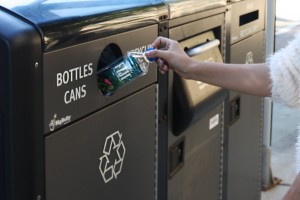
A coalition of bottling company supporters is launching a television advertisement campaign to encourage Massachusetts voters to deny an update to the “bottle bill,” a referendum on the Nov. 4 ballot allowing for the expansion of the Commonwealth’s bottle deposit law to include all non-alcoholic containers.
The No on Question 2: Stop Forced Deposits coalition is comprised of a number of bottling companies, grocery stores, citizens and community organizations, said group spokeswoman Nicole Giambusso. Their ad, designed to dissuade voters from voting yes on the second ballot question concerning bottling, will air in Springfield and Boston as the general election approaches.
“What we’ve been seeing is the more people learn about question two, the less they like it,” she said. “They start to look at the facts and think about just how expensive and inefficient it will be.”
Phillip Sego, coordinator of the bottle bill campaign for the Massachusetts Sierra Club, said the ad will misinform voters and that No on Question 2 is advocating in their own interests.
“The people on the other side are being really disingenuous,” he said. “They know things that go into the bottle bill are recycled 3 to 4 times as much and they don’t end up as litter. And if there is ever any litter clean up, the facts come out that a non deposit container is nine times more likely to become litter than a deposit container.”
Sego said opponents of the bottle bill must acknowledge that updating the referendum will significantly reduce the amount of litter in Massachusetts.
No on Question 2’s 60-second ad displays statistics about how the grocery industry will be affected if the bottle bill is updated, and it argues constituents should take advantage of the curbside recycling options already available to 90 percent of residents in Massachusetts.
“Question 2 will add nearly $60 million a year to grocery costs, something that is going to cost people more at the checkout counter, and there’s almost no return,” Giambusso said. “It will only increase recycling by an eighth of a percent, [and] that’s not even 1 percent of an increase for something that is going to cost people a lot of money.”
Giambusso said No on Question 2’s ultimate goal is to make single-stream recycling available to 100 percent of households in the Commonwealth, since people prefer to recycle at home.
“It’s been shown when communities use single stream, recycling rates go up dramatically, and this is what works,” she said. “We also need to put more recycling receptacles in public places so that people can recycle wherever they are whether are in a park or in an arena or just walking down the street.”
Sego said organizations in his coalition are primarily relying on their grassroots membership and dedicated members to emphasize the importance of updating the bottle bill to their friends, families and neighbors through word of mouth.
“When you look at this issue, you’ve got Coke, Pepsi, Nestle, Stop & Shop, all the giant super markets — these are giant international conglomerates,” he said. “On the other side, you have humble environmentalists. The supermarkets are saying, ‘we really know about recycling.’ Even though these companies are the same purveyors of drinks that are causing childhood obesity.”
Dennis Carlberg, sustainability director at Sustainability BU, said updating the bottle bill would benefit the environment.
“The bottle bill is really important because it reduces waste and gets bottles into the recycling stream,” he said. “There are a lot of bottles now that are not for deposit that end up in the trash. We can get our recycling right up to 80 percent nationally. Updating the bottle bill will have a very positive impact and lead to a more sustainable future.”
Benjamin Tocchi, 32, of Brighton, said the bill could have a significant positive impact on the environment.
“Trend-wise, people are buying less soda and more water and Gatorade and other things that are not currently covered,” he said. “It encourages recycling and less landfill use.”
Christine Crow, 25, of Brighton, said large companies should be engaged in broader efforts to benefit the environment.
“Companies should be more aware of sustainability and their effect on the planet,” she said.” They should be socially responsible in order to promote our planet.”























































































































Steve • Sep 19, 2014 at 2:57 pm
YES on 2! Reduce litter and increase recycling.